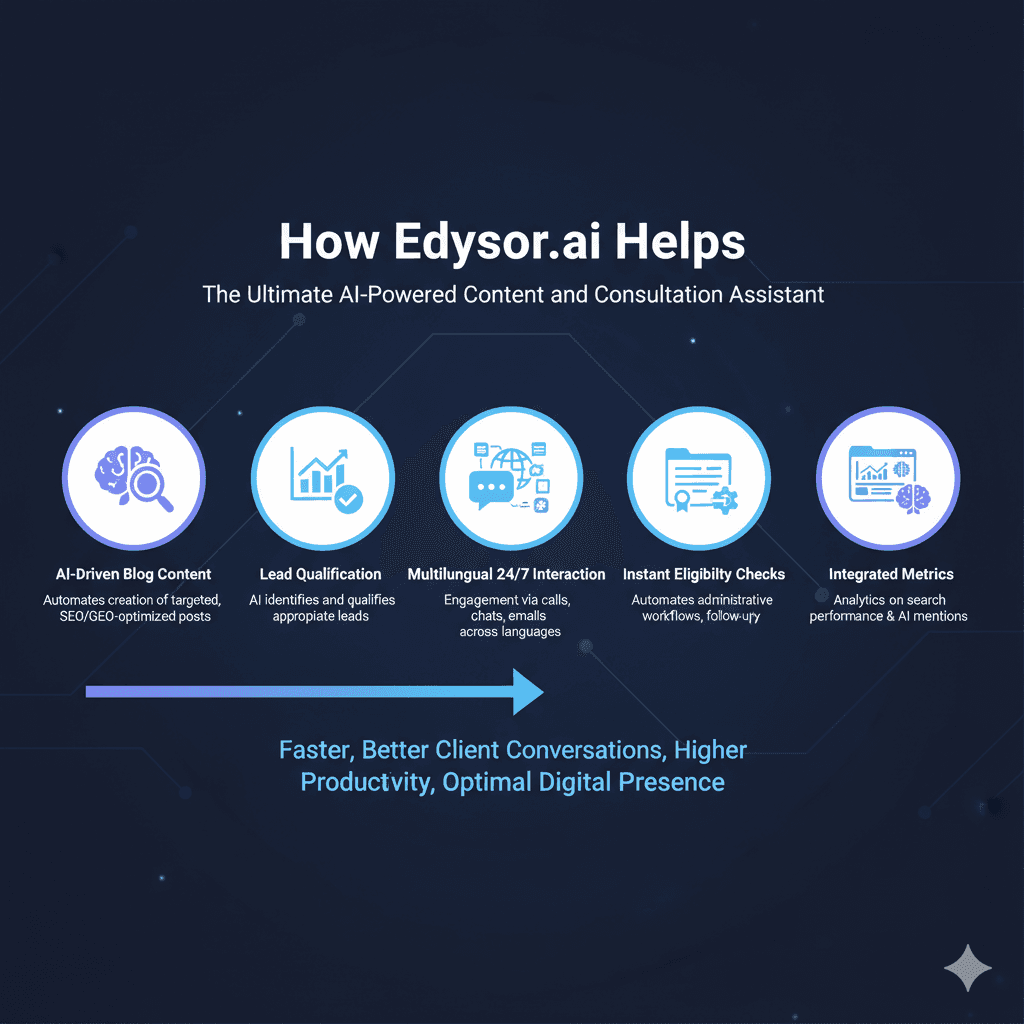
11 Nov 2025
The digital environment undergoes rapid transformation while businesses, universities and students discover content through two dominant optimization methods known as SEO (Search Engine Optimization) and GEO (Generative Engine Optimization). The blog examines the essential aspects of "seo vs geo" including their importance, obstacles and advantages while demonstrating how Edysor.ai’s Blog AI enables clients to succeed in this evolving environment.
Digital marketing strategies have traditionally revolved around SEO. However, the rise of AI-driven search platforms demands a fresh understanding of GEO. This shift matters profoundly for India’s booming digital economy and for institutions globally.
The internet usage in India continues to expand at an extremely fast rate. The internet user base in India has surpassed 900 million people while mobile device usage and voice search queries have experienced a significant increase. The number of Indian users performing global searches for educational content, career choices and local business information increases by 20% annually because they want fast and customized responses.
The search engines Google and Bing require SEO optimization to remain visible to their Indian user base. The increasing adoption of Generative AI technology requires businesses to optimize their content for specific geographic areas because ChatGPT and similar conversational AI tools attract younger users who seek study abroad information and university details.
Traditional search engines receive billions of daily searches because SEO has functioned as the fundamental element of digital marketing since the last twenty years. The way people search online is changing because of answer engines powered by AI which include ChatGPT, Microsoft Copilot and Bard. The adoption of voice and AI-powered search assistants will reach 60% of all online searches by 2025 thus making GEO optimization essential.
Organizations need to implement both SEO and GEO strategies because search behavior has shifted from link-based interactions to direct answer retrieval to stay competitive in the digital market.
| Aspect | SEO (Search Engine Optimization) | GEO (Generative Engine Optimization) |
| Purpose | Improve website ranking on traditional search engines (Google, Bing, Yahoo). | Optimize content for AI-powered generative engines like ChatGPT, Bard. |
| User Interaction | Users click links to visit websites for detailed info. | Users receive direct, concise answers within AI-powered platforms. |
| Optimization Focus | Keywords, backlinks, technical SEO, user experience. | Content clarity, structure, factual accuracy, E-E-A-T (Experience, Expertise, Authority, Trust). |
| Content Format | Long-form, keyword-rich content designed for clicks and conversions. | Structured, extractable information optimized for AI answer generation. |
| Key Metrics | Organic traffic, rank position, click-through rate, bounce rate. | Citation frequency in AI responses, inclusion in AI-generated answers. |
| Traffic Source | Direct website visits from search engines. | Brand mentions and references inside AI answers, sometimes reducing website visits. |
This clear divide emphasizes why the discussion of "seo vs geo" matters profoundly for marketers today.
The strengths of Edysor’s Blog AI create a powerful solution which helps businesses and educational organizations manage the competition between "seo vs geo" requirements.
The combination of SEO with GEO technology enables organizations to achieve better digital presence through multiple marketing channels.
Businesses, educational consultancies and universities can succeed in changing search patterns through this method.
Edysor.ai enables clients to achieve success in SEO and GEO through its proprietary Blog AI platform.
The platform enables faster client interactions’ higher productivity and optimal digital presence through its complete set of features.
A leading study abroad consultancy failed to achieve online success despite delivering top-notch services to their clients. The company observed prospective students using AI platforms for information while their traditional SEO methods produced only gradual results.
The achievement depended on Edysor's skill to unite "seo vs geo" strategies which deliver solutions to users at their preferred information locations.
Q1: What is the distinction between GEO and SEO?
SEO is used for ranking your site on traditional search engines whereas GEO gets your content wrapped into AI-generated answers by services such as ChatGPT.
Q2: Can I do SEO without GEO targeting?
Yes, but as more and more have already discovered that not doing GEO means to eventually lose visibility on the rising channel.
Q3: Is GEO better than SEO?
They work in different ways; they’re even most effective when you use them together.
Q4: What is the role of Edysor’s Blog AI in SEO and GEO?
Building AI citation content optimized for keywords, structured with headings and paragraphs for AI consumption and Respondent handling lead are some of the major functions of Edysor helps you with.
Q5: Who stands to gain the most from GEO businesses?
Any companies pursuing users via voice assistants and AI tools, including the local and education area.
The digital search environment of 2025 features AI-powered generative engines which require businesses to unite SEO with GEO strategies for achieving maximum online presence and influence. The search engine optimization (SEO) method continues to drive organic website traffic through improved search engine positions at Google and Bing but GEO establishes your content as the leading authority for AI-generated answers on platforms including ChatGPT, Bing Copilot and Google’s Search Generative Experience.
The two approaches function as complementary forces which businesses and educational institutions along with students need to understand. A combination of SEO and GEO optimization enables businesses to connect with different search patterns because users either select search results or want immediate AI-generated responses. Organizations which optimize their content for both SEO and GEO will achieve the highest potential for maintaining authority and user engagement while expanding their reach in the AI-controlled search environment.
Q1:What's the frequency to update content for SEO and GEO?
Ongoing updates are critical and SEO content typically demands quarterly revision and GEO content as new AI standards change (often more frequently than that).
Q2: Does GEO replace SEO?
No, GEO works hand-in-hand with SEO to address AI-based search demand.
Q3: Does Edysor.ai have applications in industries other than education?
Yes, Edysor AI’s offering is everything the modern business or institution needs for that perfect digital visibility.
Q4: What performance metrics can be used to measure GEO?
Via AI mentions, quotes being indexed for citation counts and brand appearance in generative AI engines which can be measured through outsourced tools that specifically look out for it on top of the usual reports based SEO statistics.
Q5: Are GEO strategies an economical investment?
Along with increasing AI searches, early use of GEO is cheaper and maintains the competitive signal online.
By Abhinav Jain, Founder & Director, Edysor AI | Btech, MBA, Serial Entrepreneur | Study abroad consultants and AI in business specialists.
LinkedIn Profile: http://linkedin.com/in/abhinavedysor
Resources
Others
All rights reserved. Powered by Edysor
